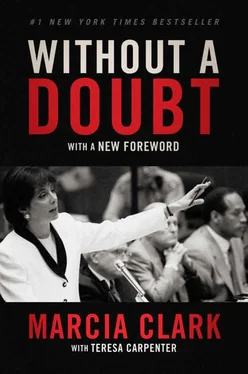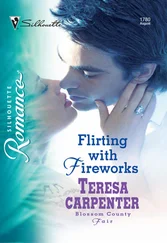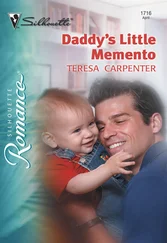“For today,” I said, “we are convened for the testimony of only one witness.” And I called Brian Kaelin to the stand.
“Mr. Kaelin,” said the foreperson when Kaelin stumbled to the witness chair, “please state and spell your full name, speaking directly into the microphone.”
He looked a bit dazed. “B-R-I-A-N G-E-R-A-R-D K-A-E-L-I-N.” Well, at least he could spell his name.
I turned to him. “Mr. Kaelin, were you acquainted with a woman by the name of Nicole Simpson?”
He fidgeted a bit, and then looked down at a piece of legal paper. Finally he spoke, in the tremulous tones of a child reciting a poem he doesn’t quite understand. “On the advice of my attorney,” he said, “I must respectfully decline to answer and assert my constitutional right to remain silent.”
God damn .
“You seem to be reading from a piece of yellow paper,” I said. “Did your attorney write that out for you this morning?”
“On the advice of my attorney, I must respectfully decline to answer and assert my constitutional right to remain silent.”
I couldn’t believe that this twerp was taking the Fifth! He read from that paper three more times before the foreperson warned him that his refusal to answer questions was “without legal cause” and that if he persisted in his refusal, he would be held in contempt. Now we had to find a judge to do just that, pronto. When Kato stepped down, David and I went down to the court of Judge Stephen Czuleger, a former federal prosecutor who was the designated hitter for issues that arose before the grand jury, to ask him for a ruling on the plea. I’d always pegged Czuleger as smart and forceful and I hoped he’d put an end to this nonsense.
He didn’t. At least not 100 percent. While agreeing that Kato’s situation did not seem to warrant his invoking the Fifth Amendment, the judge didn’t find it unreasonable to allow him and his attorney the weekend to confer.
I humbled myself before the grand jury, apologizing as handsomely as I could for having dragged them in for nothing. I silently prayed they wouldn’t hold it against me. Even worse, would they reject any of Kato’s future testimony because he had taken the Fifth?
Great. What a way to start.
Shortly after I got back to my office, Phil called. I could tell from the agitation in his voice that something awful had happened.
“Simpson’s escaped,” he said.
Dear God , I thought, do we ever look like morons .
The events of the next few hours defy linear recall. I’d never seen David so furious. And Gil? Poor Gil was in the unenviable position of having been left out of the loop in the surrender negotiations by the cops, and then having to take heat for it. He handled it with his usual cool, even taking pains to defend the police department for a commendable job in preparing the evidence.
Me? It’s difficult in retrospect to sort out all the conflicting feelings I had that afternoon. I know I had one secret, unworthy thought. I’d been getting a bad feeling about this case. Maybe I’d gotten myself into something I couldn’t handle. Part of me was thinking, The most graceful way out of all this would be if Simpson went on the lam - and disappeared off the face of the earth …
News of the escape spread like a Santa Ana wind. The phones in the press office were ringing wild. I felt strangely numb. As I drove home that night, I was too bummed to listen to the nonstop reports on drive-time radio.
The boys were with their father that weekend. I just tossed my bags into a corner and slumped into a chair at the kitchen table, trying to summon the energy to throw something together for dinner. Shoulda picked up fast food. At 6:30 P.M., maybe a little after, the phone rang. It was Phil.
“Turn on your TV,” he told me.
There he was. Our fugitive in a white Ford Bronco, ghosting down the freeway, police cruisers following at a discreet distance. Commentators were calling it a chase, but it looked more like a presidential motorcade. Of course, unless he’s assassinated, a president never gets this kind of coverage. I surfed the dial. It was incredible. This surreal slo-mo spectacle was being carried by all three networks. (NBC even cut away briefly from the NBA playoff game. This was serious.)
Certain images burned themselves into my memory. The sunlight streaming across Al Cowlings’s jaw. The ghoulish frenzy of spectators waving placards: “Go, Juice.” An amorphous dark blob in which popular historians would struggle to find the outline of a man holding a gun to his head. Ninety-five million people watching a police drama unfolding in prime time! It was one of those peculiarly American experiences that, for years afterward, would lead strangers to ask one another, “Where were you when O. J. skipped?”
On the evening of June 17, 1994, I knew that I was at the very epicenter of this event, and yet I felt light-years away from it. I couldn’t watch for more than a few minutes. I don’t know if that was because it was too painful, or because I was just too disgusted. Sometimes you have to distance yourself from things to stay objective. I told myself that the risk to public safety was minimal. Simpson did have a gun, but he was not a serial killer. He would be caught, or he would be shot.
The jerk.
I Could never bring myself to call him O.J. And it galled me when everyone else did. No one referred to Charles Manson as Chuck. Yet even the people on my own team would talk about “O.J. this,” and “O.J. that.” I had zero tolerance for it. “O.J.‘s the ballplayer,” I’d tell them. “This is ‘the defendant.’ ” At one point, we even began fining offenders twenty-five cents each time they slipped. Bill Hodgman set out a big glass jar to collect the levy. The jar slowly filled with quarters. Not one of them came from me.
I didn’t hate Orenthal James Simpson. At least I don’t like to think of it that way. Hate is not an emotion that a prosecutor can afford. Hate clouds your thinking and distorts your priorities. The public, by and large, doesn’t understand that. When they see you standing up in court leveling allegations against the man in the dock, they assume that your conviction must spring from some deep personal animosity. Usually that’s not the case. You must never be drawn into a vendetta against the defendant. You can’t let it get personal.
Having gone on record with that noble sentiment, let me say that I reserve the right to consider Orenthal Simpson unregenerate, low-life scum.
Prosecutors do not think much of defendants as a class. I’m no exception. I enjoyed a brief and unrewarding career as a criminal defense attorney. After I graduated from Southwestern University School of Law in 1979, I was taken on as an associate by a criminal defense firm, where I was assigned primarily to represent drug dealers. I was okay defending the dopers. After all, I was a child of the sixties. “Skip a little rope; smoke a little dope”-that was my motto. I’d wrap myself in the flag and declaim self-righteously about the Fourth Amendment, how it protected us all against unlawful searches and seizures. I sprang some dubious clients and had few qualms about it.
But after a few months, I started drawing the violent crimes. Now my clients, for the most part, were defendants whose greed or stupidity had wrecked not only their own lives but the lives of everyone around them. For me, the thrill of victory was no longer enough, because every time I scored an acquittal, I had to reckon with the possibility that I might have released another rabid dog onto the streets.
The moment of truth came while I was assigned to help defend a man charged with multiple murders. They were vicious crimes, but the D.A.‘s office didn’t have the evidence.
Читать дальше












